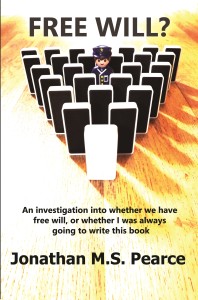I received this email through the website contact form the other night. It moved me.
Subject: I was always going to write this email.
Hey Jonathan,
When I sat down to write this email I was feeling pretty smug about my title, now I’m not so sure.
I bought your book Free Will after listening to your talk at Horsham Skeptics, well over a year ago now. I presume you’ll do these talks a lot so I don’t expect you to remember me, but due to a little narcissism on my part, I was the young Scottish lass with bobbed red hair who tried to shortchange you in the pub afterwards. (I misheard when you said how much the book was, I wasn’t trying to fit my stereotype)
I’m not really sure of the ultimate purpose of this mail other than to say I found your book highly engaging and thoroughly enjoyed reading your discourse. I start studying Philosophy in Brighton next near and your book left me excited about the conceptual engineering I’m soon to do. It also inspired me to join some introductory online courses within the fields of philosophy I’m most interested in. A primer I hope.
I read your book through-out a hedonistic camping, volunteering trip around Eastern Europe and finished it atop an Alp.(I have photo evidence, I couldn’t attach them to the message). I also live in France, for the moment, and the events of the last 10 months have terrified, perturbed and intrigued me. I fear the determined sphere in which we toil is shrinking.
Anyway, I didn’t want to ramble with my opinions of the last few months events, I’m sure there are more pressing matters in your inbox. But I just wanted to let you know I really absorbed what you had to say and the construction of your arguments. I also now feel pretty good about myself for spreading some love. :-)
Continue tippling,
Katie
And a further comment:
I really enjoyed your book. After having read Sam Harris Free Will, which is like a pamphlet and merely a rudimentary chew on the gristle of such a complex and divisive subject, I found your book eloquently and coherently added to previous arguments I have already read and fleshed them out for me and the theological argument for Free Will wasn’t one I had much considered before reading your book. I found your book a worthy contender within a realm of books attempting to explain the main points of the mine field that is free will.
I love that term “conceptual engineering” – it’s absolutely great.
I remember her very well as we sat in a nearby pub, a group of us from my talk, and chatted about everything and nothing; solving the world’s problems; investigating conceptual mysteries; having a pint. I love those talks and getting to speak to the people I talk to.
I am going through a difficult period just now for reasons I cannot go into, and this is the perfect antidote to that. That I can give, in some very small way, a meaningful inspiration to someone to take a philosophical odyssey is fantastic – what an outcome. To inspire and to motivate is partly why people like me do what we do in questing for the truth. At least, I hope it is.
This is why teachers teach. I don’t want to teach the conclusion. I want to teach the journey. I want to teach how to build the vehicle to get there.
I will leave you with the words of a nun who once spoke to us on a teacher training day. She extolled the virtues of the children and their learning being like echoes. I wasn’t the only one who found this fundamentally problematic and depressing. As educators, getting children to merely copy ideas and regurgitate them is the very antithesis of everything we should be standing for. We should be giving them the tools, the critical analysis skills, which support them in not being echoes, but, instead, sources of beautiful sound.
Yes, people love cover bands. They play what the audience already wants to hear.
But we should not want to create cover bands for the future of music. As teachers, we should want to create the next Beethoven. We should want to create children with the love of learning music and the skills of weaving sounds so that they can create their own startling symphonies.
That is teaching.
